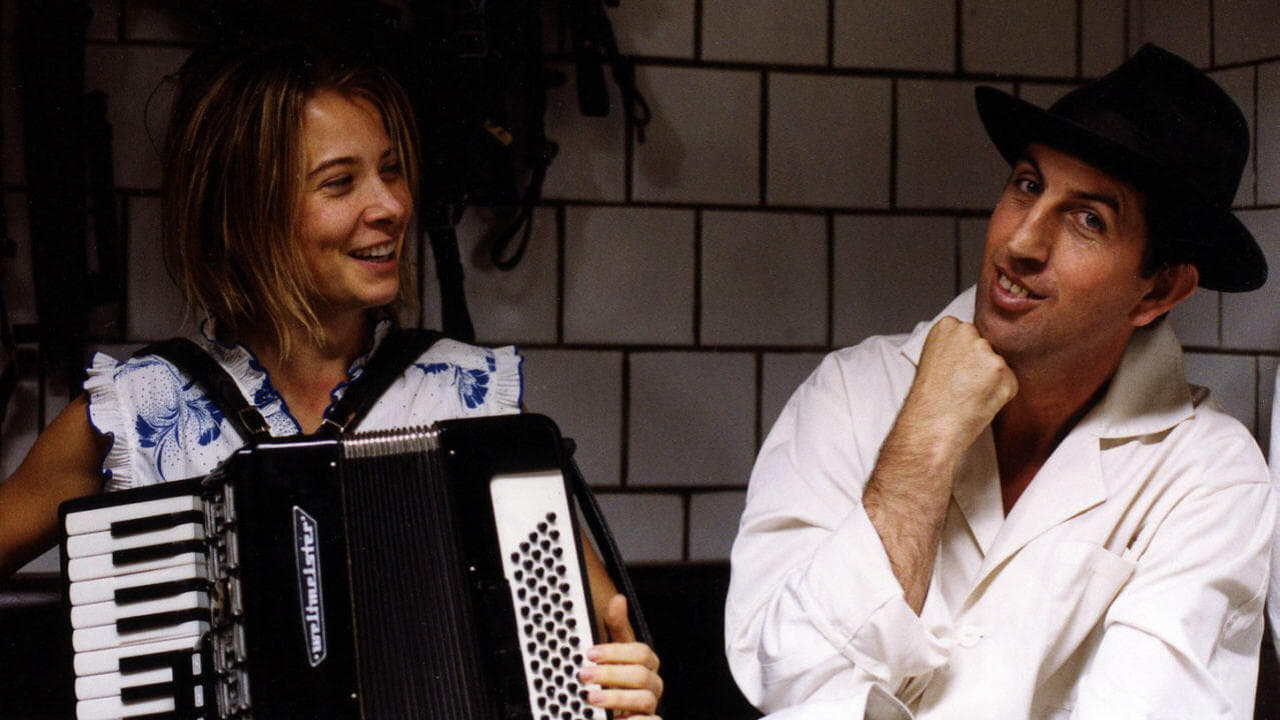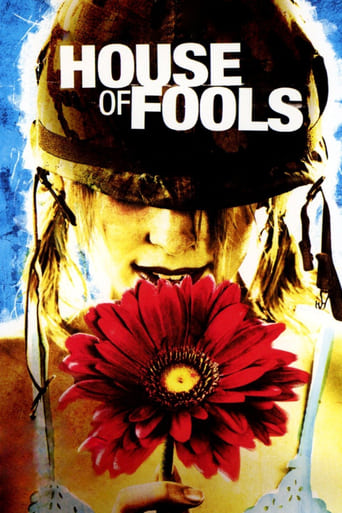SILENCEikillyou
I found this movie to be quite enjoyable. It was really quirky in several places, but since I knew it was about an asylum for mental patients in Russia, I already imagined it was going to be strange. However, the strangeness of this piece never over-powered the plot. It never detracted from my enjoyment of it.Neither did having to read subtitles (again, since I knew it was Russian). There was a large volume of rapid dialogue, so it was easy enough to read along with the story. Call me a naive or arrogant, but I had no idea Russia made such good movies. If this film is indicative of the other display of mainstream Russian movies, I'd watch them all.The main character (and actress) was a joy to watch. She had a big heart and a smile to go with it. She was able to take away moments of tension or strife (if only, possibly in her mind) when she'd play the accordian. She was helpful to all the patients and the Chechans that came to their 'home'. This story makes you wonder of some "mental patients" really belong out here with the rest of us "normal" people. And many of us out here, probably more belong in an asylum.All in all, I say this movie is worth watching, if you have an open mind. Her love and obsession for her "fiance" Bryan Adams just endeared me to her character even more. I was under the impression that she only knew one of his songs, as it was the only Bryan Adams song that would play at many intervals. More of his music would have been nice, but didn't bother the story, at all.Good quality entertainment with a large, light heart.
Jeffreybar
Quite frankly, this movie deserves a 10/10 for its wonderful portrayal of life in a mental institution caught in the crossfire between Russian and Chechen forces. But why oh why oh why did the (clearly intelligent and artful) director have to make such extensive use of Bryan Adams? I could have dealt with it if there was just one fantasy with him, or if most of the fantasies had been silent (rather than plagued with his sugary awful romance-pop), or even if (God forbid) they had used MORE THAN ONE BRYAN ADAMS SONG for these sequences. It's the same song over and over again. Ugh.That said, this movie is a great treatise on the new imperialism that is threatening to destroy the world (not just in Russia, Americans might take note here). There's clearly a lot of Fellini to be found if you go looking for it -- the accordion-playing heroine, the colorful characters, and particularly the circus music which shows up from time to time. Also, I was very strongly reminded of Begnini's "Life Is Beautiful", another film which managed to find humanity and quirky warmth in the midst of a truly awful conflict and situation.Even with Bryan Adams this movie gets an easy 8/10.
Michael DeZubiria
One Flew Over the Cuckoo's Nest is a great movie that was based on an even greater book, but I wish people wouldn't compare this movie to that one so often. Yes, the similarities are extensive and impossible to miss, but House of Fools, as the title translates into English, is a different film that has it's own weight and it's own meanings. This is not, by any means whatsoever, another vision of Ken Kesey's classic, nor is it a remake in any way of that of Milos Forman. (spoilers) Yuliya Vysotskaya, who played Janna, the main character, delivers a wonderful performance of this woman who lives in a mental hospital right on the Russian border during the Chechen War (a war about which I admittedly know absolutely nothing). Her ailment is never made clear (nor are any of the others), except for a scene in the middle of the movie where she reveals, through dialogue, some of what are probably many more illusions (I won't count her illusory belief that she can dance). As she is being abandoned by Ahmed, who she thinks is the love of her life, she tells him that she loves him, and asks him to please don't kill her. Then she tells the mud that she loves it, and please don't kill her, etc.Her mental condition is not important, although her character, while skillfully performed, is so laden with a cloying freight of symbolism that it often becomes difficult to see her as a person rather than a heavily symbolic character in a heavily symbolic movie. There is a common misconception (supported by the movie's very own tagline) that the doctors at the mental hospital around which the story revolved abandoned the patients, leaving them to fend for themselves during the Chechen War during which the movie takes place. I don't really understand this assertion, since the doctor returns at the end of the film, explains what happened to him when he went to find a bus to transfer the patients to a better hospital. Just the fact that he returned should have been enough to show that he didn't simply ditch them all.I wish I had a better memory for the names of the characters in the movie, because one of the other patients, the one with the wraparound glasses and the backpack full of his poetry, played a significant role in the movie. He and Janna are clearly the mother and father figures for the rest of the patients when they are left to their own devices, seeing over the rest of the cast and, periodically, offering the chance for audience members to question the validity of their respective mental instabilities. I don't know much about mental disorders, but there were certainly scenes in this movie where it seemed to me that they were being treated for more mental instability than they regularly displayed. These were balanced out, however, by scenes where they each displayed rather crippling disabilities, his the complete inability to communicate or assess situations effectively, and hers some dangerous attachment issues and the displacement of emotions onto things like inanimate objects. As far as the war goes, I won't go into detail about the meaning of the war itself in the film because, like I mentioned above, I know nothing about the war that is going on offscreen, but the movie makes some interesting points about the chaos and destructiveness of war. One of them is the almost-cliché of the man who saves another man's life, only to find himself fighting on the opposite side from him later on. Sort of a cliché by now, yes, but it adds to the movie's later concentration on the chaos and confusion surrounding war in general. There are several scenes in which the mental patients are understandably terrified and utterly lost as to what is going on around them. This is to be expected, but there are also several scenes in which the soldiers and even their commanders are pretty confused as to what is happening. One tense scene has two opposing factions facing each other (notably making an illicit drug deal), when one of the soldiers carelessly stumbles on his gun, making it fire off a few rounds into the air, which leads to the two groups firing machine guns at each other for several seconds before anyone realizes that it was all just a stupid mistake. The soldier who accidentally caused it laughs it off.The references to One Flew Over the Cuckoo's Nest are everywhere. The patients are left to their own devices (in this case because the doctor left longer than intended because he was delayed by the war, in the other case because McMurphy persuaded them all to escape for a while), which has a healing effect on all of them but not enough to make any of them want to leave the hospital, their home, at the end of the film. There's an interesting element of the movie involving Bryan Adams, who literally colors Janna's life with his music, even though she has a completely delusional relationship with him, which would seem to have a detrimental effect on her mental health. What I see by his occasional entrances into the movie are not some weak effort to provide recognizance by inserting an American pop star, but a layered effect of meaning that reflects the many other layers of meaning in the film. Bryan Adams, while he is not meant to have had a real relationship with this woman who thinks that she is engaged to him, lights up her life with his music (notice how the color fills the screen when it's playing), while she attempts to do the same for the rest of the patients with her own accordion playing. She doesn't always succeed with all of them, but she certainly does much more than she does with the soldiers, who she also plays for on more than one occasion, and is laughed at each time (which may very well signify some kind of juvenile cynicism among the lower ranks of military forces). I don't pretend to understand every level of symbolism that is portrayed in this movie, but it's important to notice that they're there. It's amazing how much more meaning and importance some little movie from Russia like this has than the typical multi-million dollar blockbuster released here in America, and I really wish that people would pay at least a tiny bit more attention to the few movies released (dare I say the majority of which come from other countries?) that actually mean something. There are a lot of things in this movie that are difficult to comprehend, indeed, many which seem to be in the movie as examples of pure artistic expression, but the movie as a whole, like it's main character, is so laden with meaning and symbolism that it is virtually impossible to see it all on just one viewing. The movie deserves at LEAST that much.

